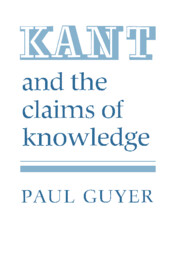Book contents
- Frontmatter
- Contents
- Acknowledgments
- Note on sources
- Introduction
- Part I Kant's early view
- Part II The transcendental deduction from 1781 to 1787
- Part III The principles of empirical knowledge
- Part IV The refutation of idealism
- Part V Transcendental idealism
- Afterword
- Notes
- Index of passages cited
- General index
Introduction
Published online by Cambridge University Press: 09 March 2010
- Frontmatter
- Contents
- Acknowledgments
- Note on sources
- Introduction
- Part I Kant's early view
- Part II The transcendental deduction from 1781 to 1787
- Part III The principles of empirical knowledge
- Part IV The refutation of idealism
- Part V Transcendental idealism
- Afterword
- Notes
- Index of passages cited
- General index
Summary
In the preface which he wrote for the second edition of the Critique of Pure Reason in 1787, Immanuel Kant drew a famous analogy between his own theoretical philosophy and the revolution in astronomy inaugurated by Nicolaus Copernicus. Previously, he wrote, metaphysics – in this, presumably, like all other sciences – had proceeded on the simple assumption that “all of our knowledge must conform to objects.” On this assumption, however, all of metaphysics's efforts toward its aim – quite unlike that of other sciences – of “determining something” about objects “a priori through concepts, whereby our knowledge may be amplified” had “gone for naught.” Faced with this failure, Kant decided to follow the “primary idea of Copernicus” and effect a radical change in the point of view from which metaphysics was conducted. Instead of continuing in the vain attempt to discover through ordinary experience universal and necessary truths which do not merely display the concepts we have already adopted but show us what sort of concepts we must adopt and how they must be put together to begin with – for only such truths are a priori yet amplify our knowledge – Kant would for once “try whether we might not succeed better in the tasks of metaphysics if we assumed that objects must conform to our knowledge” (B xvi).
- Type
- Chapter
- Information
- Kant and the Claims of Knowledge , pp. 1 - 8Publisher: Cambridge University PressPrint publication year: 1987



